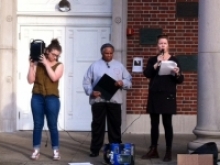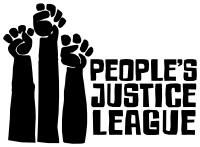
Our Director, Sarah Fick, was honored to be among those who spoke at the Black Lives Matter in Appalachia Rally hosted by Caitlyn McDaniel and Melissa Wales, held on Monday, February 20, 2017, on the Ohio University campus. Here is the transcript of her speech in full: My name is Sarah. I was born and raised in Hocking County. I work part time as a violence prevention educator and tend a small farm in Meigs County. I was asked to speak to you today about identity and resistance. My identity is complicated and confusing at times. When I come into Athens, everyone assumes I'm not from around here. I'm smart. I use big words, and I'm tuned in to the resistance. It doesn't fit their stereotypes. When I visit with my family, I'm acutely aware of how I've nearly lost what Athens people used to refer to as “my beautiful accent.” I sometimes feel like a ship without a harbor, but I am an Appalachian. It has always bothered me when white Athens folks say things like, “there just aren't that many people of color around here,” especially when it's said as part of a conversation about why our activist project or educational program has only white teachers and only white students. I've seen the census numbers, but I also see people of color everywhere I go, and when people say that, it sounds like a cop out and an erasure. Obviously, I'm white as hell, but I was raised closely with the family of my mom's best friend, Jackie, a black woman, also from Hocking County. Our two families have been intertwined for generations. Jackie's mom, Lucile Conrad, and my grandma, Geraldine LaFollette, were also best friends. They gardened together. They made pickles and sauerkraut together. They slaughtered chickens together. They went to church together. When Lucile got pregnant with Jackie, my grandma asked her family what they would think about another baby. Jackie and my mom were born a couple of months apart, and they are still best friends today, 58 years later. Appalachian culture is diverse. It is not strictly white. And when I'm asked to think about what it means to me, I picture my mom and Jackie, doing the things that their mothers did together, the kind of directly self-sustaining things that Jackie and my mom gave up in order to move to Columbus to pick themselves up by their bootstraps. The picture looks old and faded like you can't quite tell if it was a memory or dream, but I'm staring at it, trying to make it real.
I was not raised with idea that black people had a different culture, but I was raised with an awareness that people are treated differently depending on the color of their skin and that it could get deadly. During my middle years, I went to an all-white school. When a black boy briefly transferred into our district only to get beat up and then transfer back out again, my mom showed me an old newspaper clipping about her father's brother, whom I had never before heard any mention of. He had been beaten to death down a scarcely traveled country road for being a n-word lover. At the time, I wasn't sure what I was supposed to do with this information, but it had a profound and lasting effect. Some of the gaps were filled in for me in college when Professor Naji Mohammad had our class look at pictures of Emmet Till's battered body and then read the Black Panther Party's Ten Points. I began to understand the collective struggle. All my life, I had seen people struggle in a solitary and despairing way. Studying the Black Liberation Movement was the first time I learned of people forming a strategic resistance to the powers that seek to keep us down, and suddenly, the struggle took on new meaning. It felt worth it. It felt like liberation was possible.
Despite this sort of coming up, I was not able to avoid white guilt entirely. Through the public school system, I was taught white history. I was taught that white people colonized a land that was already populated. That people who looked like me killed and stole and enslaved, and I didn't want any part of that. People of color who don't know me sometimes look at me the same way I often look at unknown men, tentatively, watching for some sort of proof that I'm safe. I don't like it when people make assumptions about me based on the way I look, but I understand why it happens. I remember Emmet Till. I try not to take it personal. I work to show I'm friendly so we can get that out of the way and get on with whatever there is to do.
For me, the best way to quiet my white guilt is to be involved in the resistance, to work however I can to free all people from all forms of domination, even capitalism. I believe that liberation is possible. I believe that white people should be working harder to end racism, but that in order to work to end forms of oppression that you don't personally experience, you have to do two things: listen and make a real and specific commitment. It's very easy for white people to get lazy on resisting racism because we don't always get the constant reminders, so we must listen to uncomfortable truths, things we are privileged to afford the opportunity to looks away from, but things we must see. Then we must make a real and specific commitment to do whatever we find in our strength to do because the answer is not just going to magically present itself to you.
At this moment, I pledge before you all now to be part of the resistance by being an active bystander as situations arise, but also by going out into these hills to work with our youth. It might sound cheesy, but if we are to have a future at all, the children are the future. I've been working as a violence prevention educator in this area for four years, and when the outlook seems grim and I start to despair, it's the children that give me hope. They know in their hearts that some things just aren't right, but for poor kids, survival options can seem limited and with all of the pressures that kids face, its too easy to come to the conclusion that conforming to the status quo is necessary for survival. So I pledge to find those poor kids who might have racist, misogynistic, or drug-addicted parents. I pledge to teach them conflict resolutions skills and critical thinking skills, things that are seriously lacking in our public education system right now. I pledge to show them collective resistance, to teach them that squabbling amongst ourselves is exactly what the oppressor wants us to do, to let them see inside my life, to show them that there is a better way.
